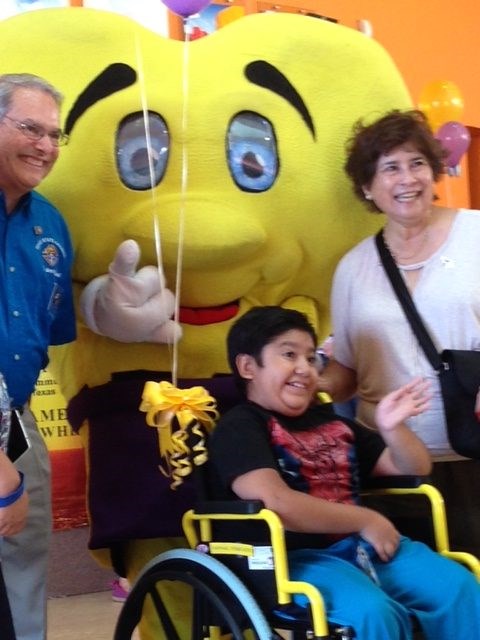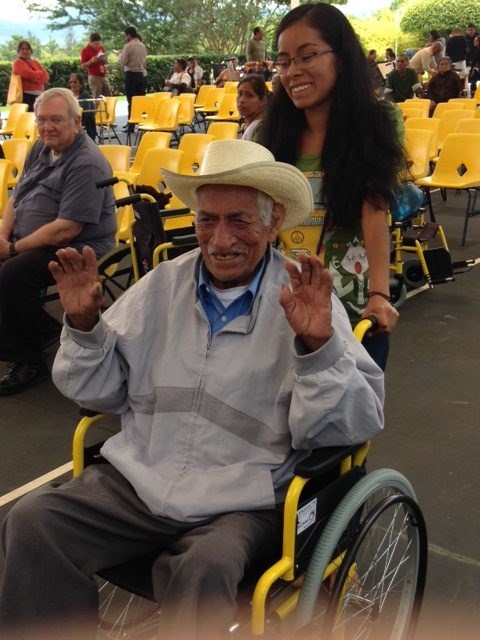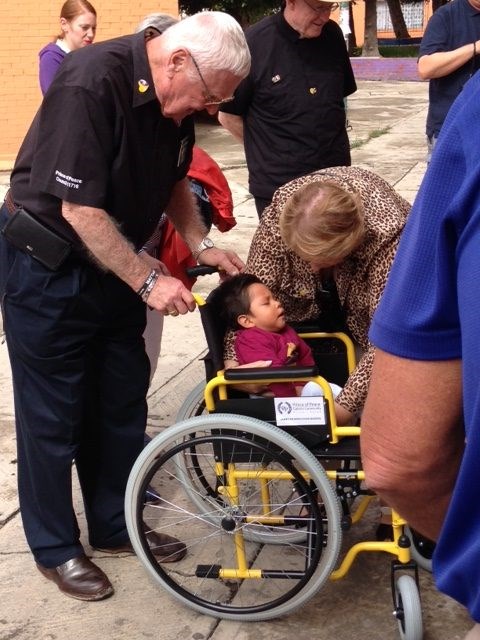The eyes of the 6-year-old girl lit up when she was lifted and placed in a wheelchair for the very first time.
Before the gift of mobility, the little girl was relying on others to carry her from room to room, placing her in a crib because she couldn’t walk. As volunteers rolled the new wheelchair into the simple dirt-floor home, her grandmother, who had recently lost her husband, broke into tears.
“I have been praying for this day for so long,” she cried as the little girl now wheeled happily about, excited she could soon go to school. “My prayers are answered.”
The smiles of the little girl and her grandmother are what 65-year-old Bill Weber of Plano says he will always remember from his mission trip last year to Oaxaca, Mexico. It’s the same kind of joy he has seen over and over again while leading 10 annual wheelchair drives and distributions to different cities in Mexico in conjunction with a worldwide ministry. Oaxaca was his sixth trip to Mexico as a member of the Shaun P. O’Brien Knights of Columbus Council 11716 at Prince of Peace Catholic Community in Plano in partnership with the American Wheelchair Mission, which has distributed more than 800,000 wheelchairs worldwide to physically disabled children, teens and adults.
Over the past 10 years, parishioners of Prince of Peace Community have donated nearly $696,000 to provide about 2,700 standard wheelchairs and 400 more expensive specialty wheelchairs.
This year alone, Prince of Peace parishioners donated $133,974, which exceeded last year's total of $129,407, making it the largest donating parish not only in the state but in the world, providing 32 percent of the state total of $413,394. The POP Council received a Star Council Award and was named Council of the Year, mostly for its involvement in the wheelchair mission.
That’s quite a feat, considering that the COVID-19 pandemic sidelined many of this year’s pulpit talks that have proven to boost fundraising. October would have been Weber’s seventh trip to Mexico to deliver more wheelchairs, but the event was canceled due to concerns over the spread of the coronavirus.
The 380 wheelchairs, including 100 specialty chairs, purchased by Prince of Peace parishioners made it to Mexico, this time to the city of Aguacalientes. But they remain neatly boxed up in a container at the Teletón Rehabilitation Center for Children (CRIT), which remains temporarily closed, another tragedy of the pandemic.
“We are heartbroken that we won’t be able to go this year, but the need is still there; it’s not going to change,” Weber says. “Meeting the recipients of the wheelchairs is always very touching and the people at Prince of Peace are so very generous. We will keep raising funds. And we will be back.”
The pandemic is not stopping the parishioners from reaching out locally. A storage container in their church parking lot contains wheelchairs for those around the Dallas-Fort Worth area who might need them. They recently brought a wheelchair to a marine veteran in Plano who had been waiting for a new wheelchair for more than a year. Several others were donated to a clinic in McKinney.
Although the mission reaches out to other areas in the United States and the world, Mexico is a region of great need. There, Weber and his fellow parishioners each year distribute wheelchairs at one of the 22 advanced and architecturally beautiful CRITs throughout Mexico. These world-class centers, staffed by doctors, nurses and therapists, use medical and holistic approaches in dealing with every type of physical disability. Whole families are involved in the free or low-cost treatments and exercises given to the children so they can continue the therapies at home. But the centers depend on the donated wheelchairs.
The CRITs were built and funded through annual televised Spanish-language “Teletóns,” which were started in 1996 by a former associate of comedy legend Jerry Lewis, who led the well-known Labor Day Muscular Dystrophy telethons in the United States for decades.
Lewis’ son, Chris Lewis, the president and CEO of the American Wheelchair Mission that he helped found, joins the Plano parishioners on their trip each year to Mexico. He particularly commends the parish for raising enough money to include specialty wheelchairs, which can cost almost three times as much as the standard chair.
“The Knights and parishioners at Prince of Peace in Plano are such a blessing,” he says. “Their generous donations and volunteers have transformed hundreds of lives. Their pastor, Father Tom, has been so receptive to the mission and you can’t find a heart that’s in a better place than in Bill Weber.”
Starting with a passion
Weber’s passion for the ministry is personal. His brother, Ronnie, who also relied on a wheelchair, was 20 years old when he passed away in 1973. So when Bill Weber was given a DVD about the American Wheelchair Mission in 2009 he was deeply moved by the work of the program.
“There was such a great need that I wanted our Knights council at Prince of Peace to do more than just provide the one wheelchair we were donating each year,” he says.
Weber went to Father Jim Balint, then pastor, with the idea of conducting a wheelchair drive. The priest gave his approval without hesitation.
With that inaugural Wheelchair Drive in 2010, the Prince of Peace Knights of Columbus council had no idea what to expect. They wound up raising $23,225, enough to fund 154 wheelchairs. As the Wheelchair Drive became an annual tradition, contributions rose steadily.
The first few years Weber traveled alone to Mexico but soon he was joined by church clergy and other parishioners. Elaine, his wife of 40 years, joined Weber the last four years on the trips to Mexico to distribute wheelchairs.
Each brand new wheelchair would normally sell for more than $500 in a medical supply store. But because they are shipped in bulk containers directly from the factories to the country of delivery, the cost is $150 each with a certificate that can be personalized as a gift in honor or memory of a loved one.
The wheelchairs allow children with physical disabilities to go to school for the first time and move themselves around their house without crawling or being carried. They can go outside to play with their family and friends, go to church, and aren’t limited to just the places where they can be carried. Adults once confined to their homes can go to work to provide for their families and the elderly can get out of a bed that they may have been confined to for years at a time.

Hearts changed
Since starting the mission at Prince of Peace a decade ago, Weber, a grandfather who is retired from the information technology field, has expanded his efforts to at least nine parishes in the Catholic Diocese of Dallas. Statewide, donations have grown.
His leadership and his commitment resulted in the Mobility Hero Award in 2017 and he now serves as the state of Texas Wheelchair Chairman. Weber said he intends to push more Knights of Columbus councils across the state to contribute, with a goal of involving all 700 councils in the mission.
Parishioners from Prince of Peace who go on the annual distribution trips say they are changed by the experience.
“The first time I saw a little boy on the back of his father, I didn’t realize that was his only form of transportation,” says Dick Leyendecker, 85, who traveled with the mission to Merida and last year to Oaxaca. “It touched me tremendously. I saw that and realized how fortunate we really are.”
His wife, Lorraine, 82, who accompanied him on the two trips, points out how each wheelchair affects at least 10 people, including the parents and siblings, teachers and doctors.
“We see the good the wheelchair is doing, how it changes the lives of a child and their family and how they can go to school for the first time,” she says. “Then we come back with stories to encourage others to go. It’s such a humbling experience because everything they have they see as a gift from God.”
Going together with other parishioners also builds relationships, her husband adds.
“I’ve met people in Mexico who go to church with me in Plano and I never knew,” he says. “Now we’re friends.”
The Leyendeckers don’t know how many more trips to Mexico they will be able to make but they say their bags are always packed.
“I can’t wait to go back,” Dick Leyendecker says.
Father Tom Cloherty, pastor of Prince of Peace, has made the trip to Mexico four times to distribute the wheelchairs.
“Not only were my eyes opened to the need for and benefits of a wheelchair, but even more so, my heart was very much opened as well,” he says. “That experience taught me that it was not just the life of the recipient that was touched but the heart of the recipient, their family, and the donors as well.”
Several wheelchairs have been donated in the name of parishioner Nelly Carr, who accompanied her husband, David, on a distribution trip in 2016 in La Paz, Mexico. She passed away in 2018 after a battle with leukemia. Her husband returned in 2019 to help deliver wheelchairs in Oaxaca to honor his beloved wife.
David Carr recalls a time when Father Stephen Ingram, associate pastor at Prince of Peace who had accompanied the group on the trip, bent down to bless a little girl as he placed her in a wheelchair.
“He raised his hands to offer the blessing and she raised her hands and gave him a high five,” Carr says. “She was very happy and pleased. This was apparent because she took off like a rocket in her new chair throughout her yard. I now could see Nelly smiling with us all.”
The giving becomes contagious even across international lines, says Dan Stoffel, a parishioner at Prince of Peace who has gone to Mexico four times with his wife, Monique, to distribute wheelchairs. Each time he sent photos and letters about his experiences in La Paz, Puebla, Merida then Oaxaca to his elderly mother in Minnesota.
“We come back with more stories to share and the numbers keep growing,” he says. “It’s the highlight of the year for us because it’s the one place we can go where we can see real joy and hope in the simple things.”
Stoffel recounts the time a mother carrying her son on her back invited the group into their home. A pot of carrots was boiling for lunch in a kitchen heated by a propane tank. An outhouse was behind the house and they brought water in to drink. The floors were mostly dirt and she brought the group into a bedroom where the finest piece of furniture was made of cardboard and painted blue.
“When we present them with a wheelchair their world lights up,” he says. “We can see the answer to many prayers.

Keeping the faith
In the churches in Mexico, families believe in prayer. They celebrate every Mass as if it were Christmas. They seem to share a sense of peace and happiness. Even the dogs don’t bark at passersby.
Most of the wheelchairs are distributed at the CRITS, which are run mostly by volunteers and mainly lit with natural sunlight. Some centers have a swimming pool where the children receive therapy.
In their cinder block homes, residents seem content to sleep in hammocks hanging along the walls. Families welcome visitors with hugs and homemade cookies. They serve guests Coca-Cola in glasses borrowed from a neighbor.
“They may speak Spanish, a different language than most of us, but we know what each other is saying,” says parishioner Kathleen Welsh, 59, who traveled to Mexico the last two years to distribute wheelchairs. “They are so joyful. I just want to take them home with me. But they are happy where they are.”
That’s because they have faith that good things happen, she adds.
One boy who is nonverbal and has cerebral palsy practically threw himself out of the old wheelchair he had outgrown when he saw a volunteer approaching with a new one.
“The look on his mom’s face—it was as if the weight of the world fell off her shoulders,” says Welsh, who works as a hospice nurse in the Dallas area.
Some families will wait a long time to receive a wheelchair but they don’t expect one. They see it as a gift, she says, and the forming of a new relationship. She gave her gold-colored name badge to a little girl who liked it. Her husband, Steve, carried another little girl like she was his own and cried happily as he put her in her first wheelchair.
She also recalls meeting two brothers, both with muscular dystrophy. The older boy was in a wheelchair but he shared it with his younger brother who sat on his lap so he also could get around. They couldn’t afford two wheelchairs.
When the mother received a new wheelchair for her child she began shouting for joy.
“She kept saying, ‘My child can go to school now. He can go to school,’” she recalls. “It’s so emotional and so life-changing you can’t help but come back with a whole new attitude about the world around you.”
Stories like these make it real to those who want to donate a wheelchair, even if they can’t go to Mexico to distribute them.
One young girl at Prince of Peace knocks on neighbors’ doors each year to collect money for the wheelchair mission. Her first year she didn’t receive much but then she was able to collect $150, then $450 the following year. Last year she received $600 in donations. This year, because of the pandemic lockdown, she sang a song online and collected over $1,000.
“When the going gets rough, Prince of Peace digs deeper,” Stoffel says. “In Plano, where we have so much, we yearn for that same simple joy we see in the families in Mexico and we know when we give to the Wheelchair Mission it’s going to a good cause.”
Stoffel has donated several chairs in the name of others, including one in honor of his mother who passed away last year. She was 95 years old.
One day as he was cleaning out her room, he opened the seat cushion on the walker his mother used to get around. He was getting it ready to lend to his friend to help him move about after surgery. Inside, he found all the photos and letters he had written to her about his experiences with the Wheelchair Mission in Mexico.
“She kept all of them with her and talked about the mission with her friends wherever she went,” he says.
The mission is making an impact in Mexico. It made an impact with Stoffel’s mom and her friends in Minnesota. It’s continuing to make an impact in Plano.
“Our mission is touching hearts and making a difference everywhere,” Stoffel says. “Our mission is one walker, one wheelchair, one changed life at a time.”
To donate one or more wheelchairs through Prince of Peace or to learn more about the mission, go to www.amwheelchair.org/donate, select Knights of Columbus in the drop down box of the Campaign field and enter "Council 11716" in the organization field.




